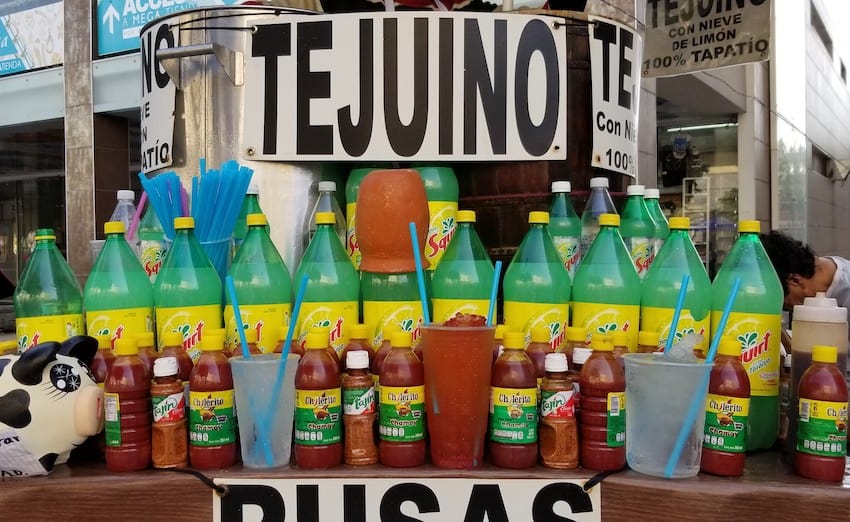an increasingly popular ancient Mexican beverage

When it comes to traditional Mexican beverages, tejuino stands out as one of the most unique and refreshing. Originating in the western regions of Mexico – particularly in the states of Jalisco and Michoacán, tejuino has been a beloved drink for centuries
Tejuino’s distinct flavor and cultural significance make it an iconic part of Mexican culinary heritage.
The history of tejuino can be traced back centuries, and its creation is believed to have been inspired by the Indigenous Wixárika or Huichol people’s profound connection with nature and spiritual beliefs. The Wixárika reside in the Sierra Madre Occidental mountain range, encompassing the states of Jalisco, Nayarit, Zacatecas, and Durango.
The main ingredient of tejuino is a dough made from ground corn kernels, which is then cooked, mashed and mixed with piloncillo (unrefined cane sugar) and water.
This mixture is left to ferment for several days, allowing the natural sugars to develop and infuse the concoction with its distinctive taste. Once the fermentation process is complete, it is enriched with a splash of lime juice and served over ice. The result is a light, effervescent, and refreshing beverage that is perfect for quenching your thirst on hot Mexican days.
Tejuino is typically served in a clay or glass container called a jícara. In less traditional environments it is poured over crushed ice, and some variations include adding a scoop of nieve de limón (lemon sorbet) on top. Traditionally, a wooden spoon or straw known as a “tutu” is used to mix the drink and scoop up any remaining corn solids, enhancing the overall texture and flavor.

Within Wixárika culture, Tejuino plays a significant role in ceremonies and celebrations. The beverage is seen as a sacred link between the living and the departed, a way to honor their ancestors and invoke their presence. During religious rites, it is offered to the gods as a token of gratitude and a symbol of unity among the community. Sharing a glass of Tejuino is akin to sharing a piece of shared heritage, reinforcing the bond among family members and fellow Wixárika brethren.
As well as its traditional roots, tejuino is also recognized for its potential health benefits. The fermentation process involved in its preparation introduces probiotics, aiding digestion and promoting a healthy gut. Its natural ingredients, including corn and piloncillo, also provide essential nutrients and antioxidants.
Like most fermented beverages, tejuino does contain traces of alcohol. The alcohol content in this traditional drink is nominal, at less than 2%.
Despite its deep cultural significance, tejuino faces some challenges in the modern world. As globalization influences traditional practices, there is a risk that this age-old art of brewing might fade away. Additionally, the Wixárika have been grappling with cultural appropriation, as tejuino’s popularity among tourists and outsiders threatens to dilute its authentic origins and cultural roots.
Given the rising popularity of the drink, it can now be found across the country. In larger cities, such as Guadalajara and Mexico City, street vendors, markets, and traditional Mexican restaurants often serve tejuino. Some specialized merchants offer a variety of flavors and toppings to enhance the drink further.
Tejuino stands as more than just a beverage; it is a vessel that carries the history, beliefs, and unity of the Wixárika culture. It represents the richness of Mexican gastronomy and cultural heritage. Every sip of this humble elixir, holds the flavors of Mexico’s ancestral traditions and the resilience of Indigenous communities striving to keep their heritage alive. Its distinctive flavor, preparation methods, and cultural significance make it an important beverage in Mexico’s diverse repertoire.
Camila Sánchez Bolaño is a journalist, feminist, bookseller, lecturer, and cultural promoter and is Editor in Chief of Newsweek en Español magazine.
Source: Mexico News Daily

